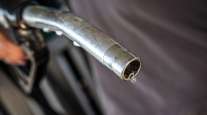Diesel Jumps to $3.425
By Dan Leone, Staff Reporter
This story appears in the Nov. 19 print edition of Transport Topics. Click here to subscribe.
U.S. diesel fuel prices rose another 12.2 cents last week to $3.425 a gallon, the second consecutive record high and the eighth increase in the past nine weeks, the Department of Energy said.
The average price of diesel has jumped more than 37 cents since the start of October, including 26.8 cents in the past two weeks, and is now 87.3 cents a gallon higher than a year ago, DOE said following its Nov. 12 survey of fueling stations.
“Basically, what we’re seeing is a continuation of what’s been going on for the past several weeks. Crude oil prices are filtering down into the retail market,” said Laurie Falter, an analyst with DOE’s Energy Information Administration.
DOE also said the retail gasoline average price also rose last week, climbing 9.8 cents to $3.111. Gas has gained 32.3 cents since Oct. 1, and a gallon is now 87.9 cents more expensive than in the corresponding week of 2006, according to DOE.
For the trucking industry, which burns an estimated 730 million gallons of diesel each week, the new price amounted to an additional $275 million in expenses last week as compared with what it cost to buy its fuel in the beginning of October.
The previous record high for diesel was set on Oct. 24, 2005, after a string of Gulf Coast hurricanes.
EIA’s Falter said although oil prices have begun to retreat from record levels, the prices of retail fuels are still catching up.
“Recently, with the crude oil prices going up so quickly, it sort of out-moved the product prices,” she said.
Phil Flynn, senior market analyst at Chicago’s Alaron Trading, told Transport Topics that tight refining capacity, which still has not fully recovered since the 2005 Gulf Coast hurricanes, disrupted U.S. refinery operations, and the stricter standards for ultra-low-sulfur diesel also have helped to push prices higher.
After reaching as high as $98.62 a barrel earlier this month during intraday trading, crude oil futures on the New York Mercantile Exchange closed at $93.38 a barrel on Nov. 15, Bloomberg News reported. Prices had fallen to near $91 a barrel earlier in the week.
“With the way prices have changed recently, [fuel] surcharges aren’t even going to be as effective as they were under normal conditions,” said Todd Polonsky, president of Aero Transporters Inc., Ellenville, N.Y.
Polonsky said his 30-truck company negotiates bulk diesel purchases from Pilot Travel Centers to help cushion the affect of high prices.
Mike Gantt, a back office manager with Charles Gantt Trucking Inc., a Lexington, S.C., food transporter with about 100 tractors, said that his company encourages drivers to use anti-idling systems at truck stops, whenever they are available.
He said if drivers cannot get access to auxiliary power, the carrier, whose longhaul operations take drivers all across the country, will pay for a motel room.
“It’s cheaper to do that than to idle your truck all night,” said Gantt, because engine idling consumes about a gallon of diesel an hour.
EIA’s Falter said that crude oil’s recent record, a major factor in the recent diesel records, appeared to be partly a market-driven phenomenon, backed by traders “making a run” at the $100-per-barrel level.
We think the upward trajectory for crude is halting,” Falter said. “We don’t see any major falloff, but we’re seeing less volatility.”
On Nov. 13, the International Energy Agency cut its global estimate for fourth-quarter demand by 500,000 barrels a day and its 2008 forecast by 300,000 barrels a day to 87.69 million barrels a day.
Two days later, DOE said U.S. stockpiles of distillate fuels fell by 2 million barrels in the week ended Nov. 9 to 133.4 million barrels, but inventories remained “in the upper half of the average range for this time of year,” the agency said.
The report also revealed a gain in crude stockpiles of 2.81 million barrels to 314.7 million barrels.




